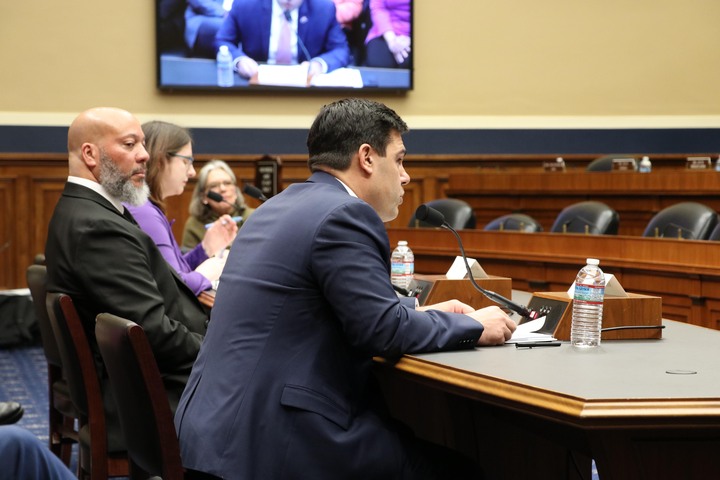WASHINGTON — Lawmakers on Tuesday drew partisan battlelines after the Biden administration paused approvals for liquefied natural gas exports, arguing over what would best protect the environment, local communities and national security.
Democrats at a House Energy and Commerce subcommittee hearing characterized the move as a moderate and necessary measure. Republicans called it a ban rather than a pause and argued it would compromise U.S. jobs and the country’s position as the top energy provider in the world.
On Jan. 26, President Joe Biden announced a pause on pending decisions on LNG exports to countries where the U.S. does not have free trade agreements. The administration said the move was intended to give the Department of Energy time to update its process for determining whether proposed LNG projects serve the “public interest,” as required by the Natural Gas Act.
Rep. Jeff Duncan (R-S.C.), chair of the Energy, Climate and Grid Security Subcommittee, called the pause “a gift to Vladimir Putin,” noting Russia is second-largest producer of natural gas after the United States. LNG exports from the U.S. allowed many European countries to switch from Russian natural gas to U.S. natural gas after the Russian invasion of Ukraine.
Democrats pointed to House Republicans’ opposition to a Senate bipartisan border bill that includes Ukraine funding.
But Biden’s pause sends a message to other countries that the U.S. is not a reliable source of energy, making them more likely to turn to other countries, Duncan contended.
Republicans argued that continuing to expand U.S. production of natural gas is the best option to promote clean energy. According to the Energy Information Administration, the U.S.’s progress in lowering greenhouse gas emissions is primarily a result of coal being replaced by cleaner natural gas. Even Russian natural gas releases 41% more emissions than U.S. gas, said Rep. Debbie Lesko (R-Ariz.).
“If the Biden administration would do the smart thing and increase LNG exports to Europe, India and Asia, we can help them reduce their coal consumption,” Lesko said. “It’s a common sense and easy task to substitute U.S. natural gas for Russian natural gas that continues to flow to our allies in NATO and the EU.”
But Europe’s current gas storage, at 96%, is among its all-time highest levels, said Gillian Giannetti, a senior attorney for the nonprofit environmental advocacy group Natural Resources Defense Council. She said most studies “strongly suggest” that the LNG being produced “will more than supply the European need,” and Europe will continue to transition away from gas.
“Given that these facilities can last up to 40 years, it’s an extremely risky investment to build LNG facilities in the 2030s,” she said.
This pause will have no impact on the LNG exports or facilities that have already been approved. Even if no new approvals are issued, U.S. LNG exports are already projected to double by 2027 and triple by the early 2030s, Giannetti said.
The energy that goes into liquefying natural gas, which is necessary to ship it overseas, offsets the “cleanliness” of the energy source, she added. The pause will allow the DOE to assess the significance of methane leakages throughout the process of liquefying and exporting natural gas, Giannetti said.
The DOE also needs to factor environmental justice into its framework, Giannetti said, as communities in proposed project areas suffer disproportionately high respiratory problems and have expressed their opposition to the plans.
Rep. Cathy McMorris Rodgers (R-Wash.) noted the job benefits of U.S. natural gas production but incorrectly characterized the administration’s pause as a reversal of these benefits.
“The administration is ignoring the fact that natural gas continues to create millions of new jobs, bring manufacturing back to the U.S. and revitalize our communities across the country,” McMorris Rodgers said. “President Biden’s LNG export ban will end these benefits for local economies, kill American jobs and increase energy prices for people across the board.” The pause does not affect current exports, supply or jobs in the LNG industry.
Other Republicans noted the immediate harm on the industry’s investment outlook. The indication of political forces entering the market would make it hard to reach necessary levels of investment, said Toby Rice, president and CEO of EQT Corporation, the largest natural gas producer in the U.S.
“The reason why it affects now, not in the future, is capital investment in an industry. If an industry knows it’s being shut down, the intensive capital investment that is needed will not be put in place,” Rep. Mariannette Miller-Meeks (R-Iowa) said.

